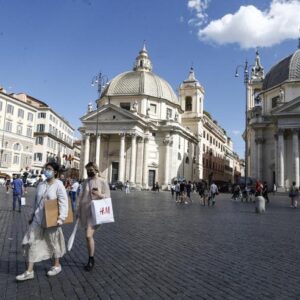The years pass, so do the governments and pandemics, but Italy never stops thinking about the United Sates.
It is probably the myth of the fabulous American lifestyle that keeps alive Italy’s interest in America. The fact is that though the international context has changed markedly from the end of World War II to today, the idea that over there, on the other side of the ocean there is a world worthy of admiration, persists in Italian hearts.
There’s interest, curiosity and at times even fear. There are many emotions, but this is normal. Thinking of the vertiginous skyscrapers of New York, or the endless spaces of the American heartland when you yourself live in an Italian city where narrow streets and low buildings prevail, must have a certain effect.
Every day the Italian media shares copious information on the health of the United States. After all, they are still the first economic power in the world. It’s hard to remain indifferent when talking about the States.
For sure, the situation is not one of the best. A cyclone has hit the United States, shaken by the coronavirus and the many anti-racial protests following George Floyd’s homicide.
The Italian press has devoted much attention to these two topics, so much so that every Italian, from the youngest to the oldest, has formed his own opinion.
Some get it through the social media, some through a newspaper, and some by watching TV. From North to South, Italy has followed the American dynamics with an ever-attentive eye, shaping a critical conscience that leaves no room for uncertainty.

Putting together responses from about 80 men and women from different professional backgrounds and political affiliation, there emerged a rather heterogeneous general picture. And that’s not a surprise: Italians are famous for splitting into factions that are often totally at odds with each other.
Thus we go from those who praise the freedom of the United States, to those who condemn it categorically. From those who believe in the American dream to those who believe that the social competition is out of control.
Massimo, a banker who was born and has always lived in Parma, loves the great spaces of the United States and the less populated areas, while Vanessa, a young student from Rome, thinks that the chaos and the dynamics of New York are the right place for her.
But everyone agrees on one thing. Even the most critical ones when asked, “Between a world still dominated by the United States and one controlled by China, where would you prefer to live?” everyone answers with conviction: the USA.
“In the United States my freedom would be respected and my life wouldn’t change much,” says Luca, a Roman restaurateur close to retirement.
China, in fact, creates fear. The Italians respect the civil obedience and their work ethic, but the communist regime and the heavy restrictions on personal freedom make it appear to their eyes as an inhospitable place. “Tremendous workers” —says the employee Fabrizio, a thirty- year old from Bologna enamored with foreign policy – “but I don’t trust them. They are too conspiratorial.”
Better the United States, even if some allowances must be made. It’s a common feeling, in fact, that in recent years their situation has progressively worsened. Especially in this last period.
Among the prominent problems are noted the poor handling of the response to the virus and to the anti-racist protests. Italy, the country of the “dolce vita,” understands the difficulty of the moment that the Western allies are facing.

Antonella, a Parma housewife well over fifty years of age, adds that “this is a very difficult time. Americans still have great economic power, but have underestimated the pandemic and now they are paying the consequences.” Patrizia, a young business executive from Milan at the start of her career, and Mattia, a medical student from Treviso who considers healthcare the critical point of the US model, are both in agreement with her.
Giovanni, 20 years of age who spent his adolescence in the valleys of the Prosecco, a mostly conservative area, has never set foot in the United States, but his dream is to achieve his success and move to an attic somewhere in Manhattan. While he talks, his eyes light up with hope; but then he becomes more somber. “The States are a paradox, both for the lack of interest on Trump’s part towards a movement of colossal magnitude like Black Lives Matter, and for the fact that a Kanye West prepares to run for president. As far as the Covid-19 crisis is concerned, I believe that Trump has given more importance to its economic impact than to the loss of human lives.”
The problems, therefore, are not the economy, work or lifestyle. The great debate ends up always concentrating on politics, and inevitably, its protagonists.
“Excuse me, can I ask you what you think of Trump?” Facing me are two very different kind of people.
On one side we have Maria, a young freelancer from Palermo, black hair, large sunglasses perched on her nose. On the other, Matteo, a young man from Emilia with a proud look who speaks his mind freely.
She starts: “The worst President the USA has ever had. Racist and ignorant.”
And he replies: “I really like him. He’s got courage and does not give a damn about what people think about him.”

All told, once we collected all the answers to our questions, it looks like the first opinion tends to prevail. Even among the varied voters of the right who in 2016 were firmly committed Trump supporters, the man elected to make America “great again” has left some bad memories.
Even more than his political policies, highly criticized by the left though supported by the majority of the Italian right, people criticize Trump for his actions, rhetoric and behavior.
For Giulia, who has just graduated from the Sapienza University in Rome, he is “selfish, megalomaniacal and conceited.” For Roberto, a physician from Parma with thirty years of practice, he is “The American Berlusconi”.
Many hope that in the November 3 elections he will be kicked out of office. Compared to the success he had four years ago, it’s quite evident that he is in decline. It could seem strange. In a historical moment in which, at least on the theoretical level, the Right represents the majority of Italians, the president that rose to power on his conservatism is now highly contested.
The explanation is simple: in a nation that for the past fifty years has been governed by the Christian Democrats, a tough and aggressive stance is not easily accepted. At least not for long.
What emerges from Italy is a cacophonic buzz. Differing opinions overlap, converge and clash. The United States, in any case, need not fear. It is still the sun and Italy the sunflower; and it cannot help but be attracted to the light. This is the way it’s been and this is the way it will be in the future. In the opinion of many, the only thing the US needs to do is to slightly adjust its angle to become once again the light that illuminates the entire West.
Translation by Salvatore Rotella












